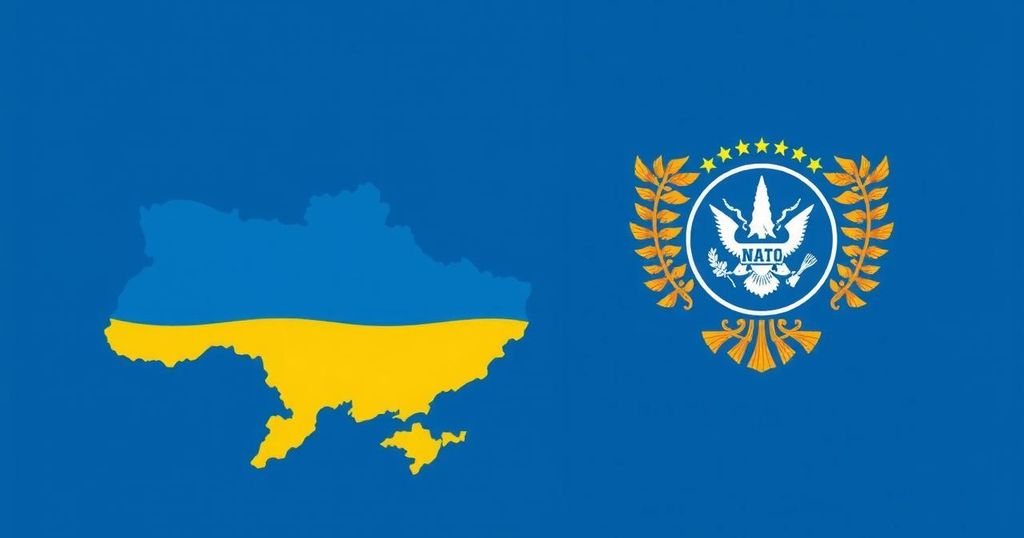US Election Impacts NATO Aid Strategy for Ukraine
The upcoming U.S. presidential election raises concerns about the future of NATO’s support for Ukraine, particularly if Donald Trump regains the presidency. NATO allies anticipate a possible reduction in U.S. aid, prompting Europe to increase its military contributions and streamline combined efforts to support Ukraine in its ongoing conflict with Russia, while addressing broader security challenges posed by adversarial nations.
As the United States approaches its presidential election, concerns regarding the future of NATO’s support for Ukraine have intensified. During a recent meeting of NATO defense chiefs, Secretary of Defense Lloyd Austin acknowledged the uncertainty surrounding U.S. military aid, particularly if Donald Trump were to reclaim the presidency. Allies expressed apprehension that American support might wane in the forthcoming year, especially against a backdrop of increasing military assistance from adversarial nations such as Iran, North Korea, and China to Russia. In addressing these concerns, Secretary Austin emphasized the need for collective action among NATO allies, stating, “We can’t expect that the US will continue to take on an outsized burden” in supporting Ukraine. He highlighted the necessity for Europe to enhance its military contributions and expand its capabilities. The notion of a diminished U.S. role under a Trump administration has led NATO to streamline its command over the training of Ukrainian troops and the provision of military support, aiming to secure more autonomy over the operation in case U.S. aid decreases. The implications of a potential Trump victory were underscored by a NATO official, who articulated deep worries about the ongoing situation in Ukraine, stating, “Optimistic is not the word I would use to describe the situation [in Ukraine] right now.” Russia continues to achieve incremental tactical successes on the battlefield, significantly outgunning Ukrainian forces. In light of this, Austin proposed that Ukrainian forces utilize less costly, locally produced long-range drones instead of expensive missiles to target crucial sites inside Russia. Amidst this atmosphere of uncertainty, European nations are striving to bolster their military production capacities, motivated not only by the need for ongoing support to Ukraine but also by their own security concerns arising from the Russian threat. A further complication arises from the current impasse on an EU and G7 plan aimed at facilitating sustained funding for Ukraine, as Hungary has obstructed necessary changes to sanctions on Russia’s frozen assets pending after the U.S. election. Meanwhile, the Biden administration is actively seeking to optimize support for Ukraine, utilizing available congressional appropriations while simultaneously investing in Ukraine’s defense capabilities. As NATO faces challenges in matching Russia’s high rate of munitions production, which is estimated at approximately 3 million per year compared to NATO’s collective output of less than 2 million, the urgency for Western allies to synchronize their efforts has never been more pronounced. Indeed, the stakes are high as NATO continues to grapple with external pressures, while internal dynamics shift in anticipation of the electoral outcomes in the United States.
The current geopolitical climate is underscored by the potential ramifications of the upcoming U.S. presidential election on NATO’s support for Ukraine amidst its ongoing conflict with Russia. Sustaining military aid and operational strategy is paramount, particularly in light of increased military collaboration between Russia and countries like North Korea and Iran. The need for NATO to maintain influence and secure independent operational capabilities is pressing, as perceptions of U.S. commitment shift.
In conclusion, the impending U.S. presidential election casts a shadow over NATO’s discussions and strategies for continuing support for Ukraine. With the prospect of a reduced U.S. role, NATO’s allies must recalibrate their military contributions and forge a collective commitment to ensure the defense and security of Ukraine, adapting to external and internal pressures as they strive to maintain unity and effectiveness in the face of escalating threats.
Original Source: www.cnn.com




Post Comment